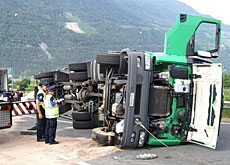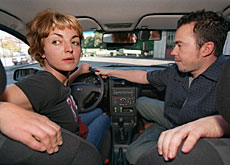Road safety reforms spark concern

A government package of around 60 wide-ranging measures to improve road safety has received a mixed response from Swiss interest groups.
The plans, announced on Wednesday and sent out for consultation to organisations concerned, include mandatory helmets for cyclists, stricter drink-driving standards and extra training and tests for drivers.
Transport Minister Moritz Leuenberger said the aim was to reduce the number of accidents that result in death and serious injury.
Some road safety organisations have backed most of the plans, saying any steps are an improvement, while others say they could be counterproductive.
Last year 384 people died on Swiss roads and 5,235 others were seriously injured. Material costs as a result of accidents amounted to SFr6.5 billion ($5.6 billion).
Among the major changes being put forward are: testing every ten years for anyone with a licence; zero alcohol tolerance for new drivers; mandatory helmets for cyclists; and a ban on bicycle-riding under the age of eight.
Zero tolerance
Road Cross, which promotes safety on Swiss roads, gave its full support to the package, adding it was particularly in favour of a zero alcohol limit for new drivers.
“New drivers are mostly young people and if you say right then that alcohol is not allowed then it is a big step towards prevention [of drink-driving],” Sabine Jurisch from Road Cross told swissinfo.
“Germany already has a zero limit approach for young drivers and alcohol. Prevention will improve safety on the streets.”
The Transport and Environment Association also welcomed the measures but said they did not go far enough and came late. It argued in particular that motorcycles and scooters, which were increasing on Swiss roads, had not been included in the package.
Meanwhile the Touring Club of Switzerland, a motoring organisation, praised the government for attempting to deal with the issue but warned that some ideas were unrealistic, such as a move to curb reckless drivers by scrapping their cars.
It added that Switzerland’s road safety measures were excellent when compared with other European countries, with the number of serious and fatal accidents dropping by 38 per cent by the end of 2006.
The organisation also pointed out it had instituted a successful training programme across the country and praised a measure which would address accident black spots.
Banning child cyclists
The cycling lobby organisation Pro Vélo largely backed the package but strongly condemned two proposals for cyclists.
One, in which children under eight would be banned from cycling, would stop young people learning how to ride and would have an impact on their physical fitness, they say.
Pro Vélo president Jacqueline Fehr told swissinfo that other plans to make helmets compulsory for cyclists would be counterproductive. The measures – in which insurers would not pay out in accidents where the cyclist does not wear a helmet – would stop people riding altogether, she says.
“This would reduce the number of people using bikes. If there are a lot of people on bikes, that helps safety by increasing their presence on roads. Within a few years it could become much more dangerous,” said Fehr.
“There is already a natural resistance to helmets. It needs to be promoted but it should not be mandatory. We will take a position against these measures and will attempt to rally other organisations.”
Open to discussion
The government’s project was first launched in 2002 under the project name “Via sicura” by the transport ministry and the Federal Roads Authority. A preliminary draft of counter-measures was drawn up in 2005.
The government plans to finance the road safety package, which will cost up to SFr300 million, from traffic fines and higher insurance premiums.
Half of the measures would involve modifications to the law. In presenting the package in Bern, Leuenberger said that the ideas were obviously open to discussion and would be revised and corrected again in line with the results of the consultation period.
swissinfo, Jessica Dacey
Drivers should have their sight and health tested every ten years up to the age of 69.
Reckless drivers who seriously break the rules should undergo aptitude tests.
Drivers over the legal alcoholic limit should have their licence suspended for six months and be forced to go on a driver’s education course. New drivers and delivery people should drive with a zero blood alcohol level.
Future road building projects should be examined on the basis of the risk of accidents. Danger spots should be identified and removed.
Seizure and scrapping of cars after serious offences such as driving without a licence.
Increased police checks and fewer warnings of police speed cameras.
Scientific research on the cause and circumstances behind accidents.
Greater powers for insurers to decide whether to cover bad drivers.
Mandatory helmets for all cyclists.
A minimum age of eight for children to ride bicycles.
Front lights of cars to remain on permanently when driving day or night.

In compliance with the JTI standards
More: SWI swissinfo.ch certified by the Journalism Trust Initiative




You can find an overview of ongoing debates with our journalists here. Please join us!
If you want to start a conversation about a topic raised in this article or want to report factual errors, email us at english@swissinfo.ch.